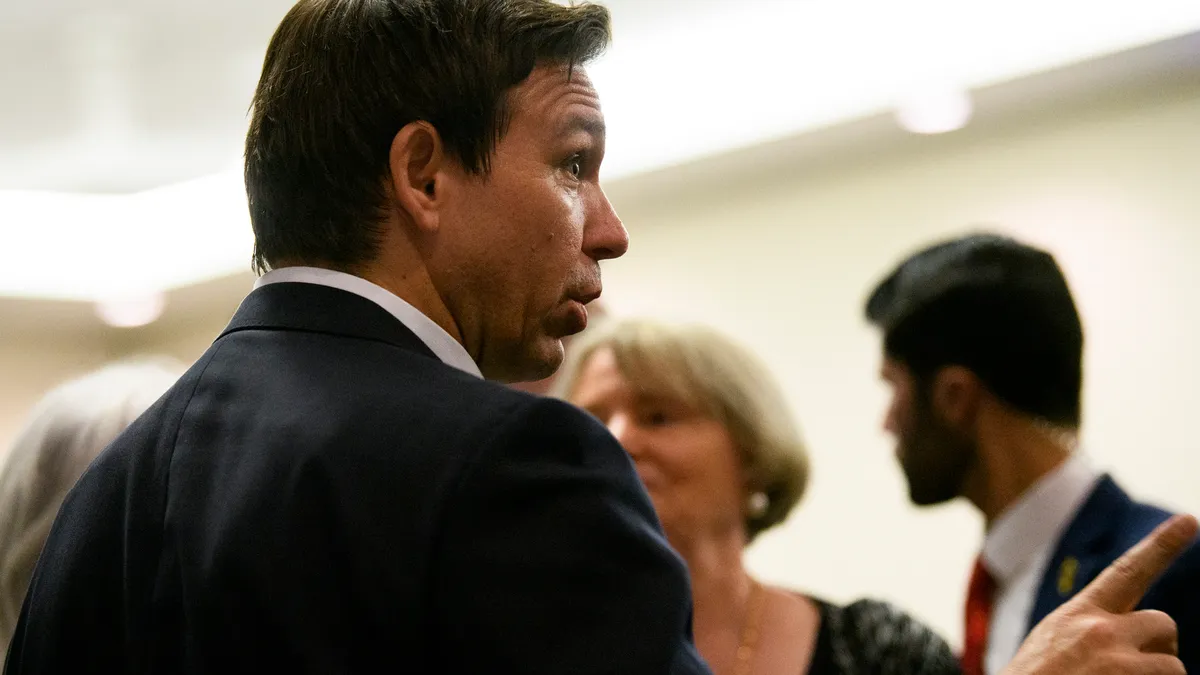Dive Brief:
- Florida lawmakers passed an expansive immigration package this week that would remove undocumented students' eligibility for in-state tuition rates at public colleges.
- If signed into law, the reversal would take effect July 1. However, the legislation has intensified a growing rift between the state's Republican lawmakers and Gov. Ron DeSantis as they compete to show their loyalty to President Donald Trump and his goal of cracking down on immigration.
- DeSantis heavily criticized the package, saying Wednesday that it "fails to honor our promises to voters, fails to meet the moment, and would actually weaken state immigration enforcement." The governor said he would veto it unless legislators approved more restrictive immigration measures.
Dive Insight:
For a decade, Florida has permitted undocumented students to pay in-state tuition rates at public colleges if they attended their last three years of high school in the state and enrolled in higher education within two years of graduation.
Republican State Sen. Randy Fine first proposed rolling back the allowance in December as a standalone bill. In January, DeSantis cited the bill as a priority when he abruptly called a special legislative session aimed at helping Trump implement tougher immigration policies.
Florida has two public higher education systems — the Florida College System and the State University System of Florida, which oversee 28 colleges and a dozen universities, respectively.
In the 2023-24 fiscal year, just over 2,000 nonresident students attending one of the university system’s institutions received a waiver to pay in-state tuition, according to an analysis of the bill prepared by the Senate appropriations committee's staff. In the Florida College System, the number was almost 4,600 that year. The combined discounts were valued at almost $40.7 million, it said.
The analysis did not disaggregate the student data by immigration status, and it's unclear how many undocumented students would be affected by the revocation of the tuition waiver. One report from 2023 estimated about 40,000 undocumented students attended Florida colleges in 2021.
It's also unclear if colleges would benefit financially from the end of the waiver, the analysis said.
"Some students who are undocumented for federal immigration purposes may choose to pay the out-of-state fee while others may choose to withdraw from school," it said. "Institutions may experience an increase in fee revenue as students pay the out-of-state fees, or experience declines in fee revenue as those students decide to withdraw from school and are not replaced by other students."
Republican lawmakers praised the final legislative package — given the backronym title Tackling and Reforming Unlawful Migration Policy, or TRUMP, Act — and said it would help the state act in partnership with the federal government.
The bill's sponsors in the Florida House and Senate, as well as the top Republicans in both chambers, also repeatedly invoked Trump's name in prepared statements.
“Supporting President Trump’s mission to secure our borders, Florida stands ready to act with the most aggressive immigration policy ever introduced,” said House Speaker Daniel Perez.
Senate President Ben Albritton touted the state's previous work on immigration.
“When it comes to cracking down on illegal immigration, Florida is already so far ahead of most states," he said.
But in a press release two days later, DeSantis' office dismissed the legislators' work as a half-measure.
Republicans hold a veto-proof supermajority in both chambers of the Legislature. Typically, this supercharged influence would be unlikely to matter, as the governor's mansion is also held by a Republican.
But DeSantis' lack of approval adds uncertainty and diminishes the odds of the package becoming law. Without his approval, it is unclear if legislators would return to the drawing board or if enough Republicans would band together to overrule his veto.
DeSantis' popularity within his own state party has weakened recently.
The governor's decision to call the special session did not receive unanimous support from his peers. The dissenters criticized the move as inappropriately getting ahead of Trump's policies.
Shortly after the session began, Florida lawmakers ended it and called their own as a means of prioritizing their goals over DeSantis'. And both Reps. Perez and Fine have publicly criticized DeSantis.
Perez suggested to the Tampa Bay Times on Thursday that DeSantis hadn’t sufficiently communicated with legislators ahead of the session. He added that “all options are on the table" to get anti-immigration legislation passed — including overriding a DeSantis veto.
The $500 million package seeks to enact measures outside of the higher education sector. It would create the position of chief immigration officer to coordinate enforcement actions with the federal government. It would also mandate the death penalty for undocumented immigrants found guilty of capital crimes — a rule that would run contrary to longstanding U.S. Supreme Court precedent and could spur legal challenges.
Nikki Fried, chair of the Florida Democratic Party, did not mince words in response to the bill's passage Tuesday.
“Florida Republicans have lost their damn minds this week,” Fried said in a statement. “Despite attempts from Democrats to protect students, this legislation promises to kick Dreamers out of college before they can finish their degree and gives huge bonuses to local law enforcement for working with ICE to ramp up deportations. It’s an unconscionable abuse of power for a state legislature."















